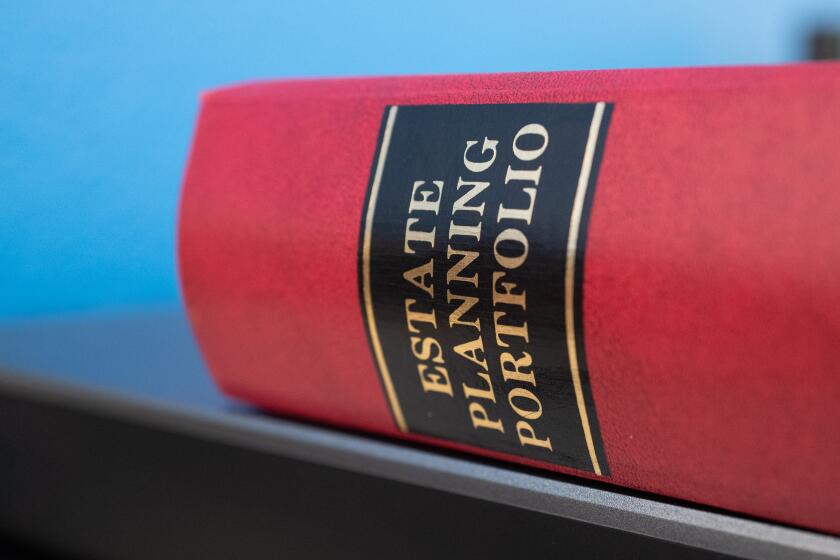Your earthquake kit should include cash. But how much?

Dear Liz: In these uncertain times, I decided I need to have cash on hand. I withdrew $500 in small bills from the bank and put it in a fireproof pouch. Is there a recommended amount of cash one should have available for emergencies?
Answer: The appropriate amount depends on how much you spend and how paranoid you are.
Many financial planners recommend storing a few hundred dollars somewhere safe in your home in case a widespread electrical outage — after an earthquake, for instance — affects ATMs and point-of-sale devices. The idea is that you’ll want enough cash to cover spending for a few days until the power comes back on. Smaller denominations are better than larger ones because you may have trouble finding anyone to give change for $50 or $100 bills.
Emergency preparedness sites tend to recommend storing even larger amounts — $1,000 to $3,000, or whatever you would need — in case access to ATMs and credit cards was affected for a few weeks.
Obviously, storing cash has its perils. The money could be lost, stolen or destroyed in a disaster. You’ll have to weigh those risks against the possibility of needing the cash, and make your own call.
Today’s topic: Supplies and equipment. You’re going to assemble an earthquake kit, familiarize yourself with it and think about precautions specific to you.
Bypass the bypass trust
Dear Liz: You mentioned in a recent column that people should check estate plans created before 2010 because they might contain bypass trusts that are no longer needed. The classic AB Trust, although not necessary now for the estate tax exemption for most people, still can be useful if one spouse wants to ensure her half of the estate goes as she desires if she is the first to die.
Answer: Possibly, but people should make the decision proactively by having their estate plan reviewed and discussing their options with an experienced attorney, since these trusts have some significant disadvantages.
Bypass, or AB, trusts were a routine part of estate planning even for middle-income couples when the estate tax exemption limit was just $675,000. When the first spouse died, a portion of the couple’s assets went into an irrevocable trust that would avoid estate taxes when the surviving spouse died. Because the trust was irrevocable, the surviving spouse couldn’t change its terms and had limited access to the assets.
Also, assets in the irrevocable trust don’t get a step up in tax basis when the survivor dies. That means the ultimate beneficiaries could wind up paying higher capital gains rates when they sell the assets. When the estate tax exemption limit was low, couples were gambling that the estate tax savings would outweigh the future capital gains cost.
Today, far fewer families have to worry about estate taxes. The exemption limit for 2022 is over $12 million per person and over $24 million per couple. Even after the current limit sunsets in 2025, individuals would be able to exempt over $6 million and couples over $12 million from estate taxes. Estate tax exemptions are also now “portable,” which accomplishes much of what the AB trust was designed to do in ensuring the exemption of the first to die wasn’t “wasted.” Now the amount of the exemption limit that isn’t used by the first spouse to die can be transferred to the survivor’s estate.
Bypass trusts are still routinely used for wealthier people and those who live in states with low estate tax exemption limits, but for many people this estate planning tool has outlived its usefulness.
After you get a will or trust, where is the best place to store those documents? Spoiler: not in a bank safe deposit box.
Guard your Social Security number
Dear Liz: You recently stated Social Security numbers were never intended to be used as a universal identifier. I’ve found that every place asking for my number has other means of identification and will ask for my mother’s maiden name or my place of birth when I tell them I don’t use my Social Security number for identification purposes. This also works for financial institutions that have a legitimate claim for having it.
Answer: To clarify, you probably had to disclose your Social Security number when you applied for accounts at your financial institutions. You also typically need to disclose it when you apply for credit, employment or government benefits.
But you don’t necessarily have to cough it up on demand to verify your identity or to do business with the many, many other companies and organizations that ask you for it without good reason to do so.
Liz Weston, Certified Financial Planner, is a personal finance columnist for NerdWallet. Questions may be sent to her at 3940 Laurel Canyon, No. 238, Studio City, CA 91604, or by using the “contact” form at asklizweston.com.
More to Read
Inside the business of entertainment
The Wide Shot brings you news, analysis and insights on everything from streaming wars to production — and what it all means for the future.
You may occasionally receive promotional content from the Los Angeles Times.










